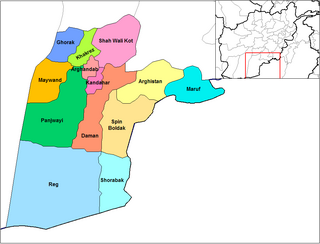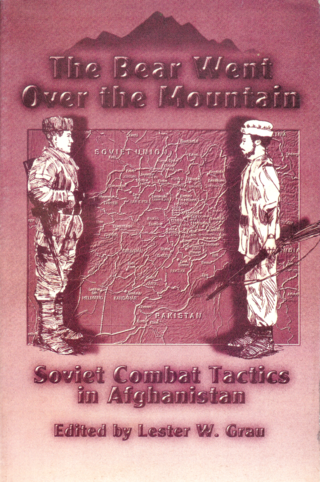The Other Side of the Mountain: Mujahadeen Tactics in the Soviet-Afghan War is a 1998 non-fiction book written by former Afghan Army Colonel Ali Ahmad Jalali and American military scholar Lester W. Grau.
The Other Side of the Mountain: Mujahadeen Tactics in the Soviet-Afghan War is a 1998 non-fiction book written by former Afghan Army Colonel Ali Ahmad Jalali and American military scholar Lester W. Grau.
The book was commissioned by the United States Marine Corps Studies and Analysis Division to complement Grau's previous book, "The Bear Went Over the Mountain." Jalali and Grau had planned travel into Afghanistan to interview Mujahideen fighters in late 1996, but were forced to remain in Pakistan when a Taliban offensive campaign started to seize major portions of Afghanistan, eventually capturing Kabul on September 27. Jalali interviewed approximately 40 Mujahideen during the month which the authors spent in Pakistan and an associate, Major Nasrullah Safi, conducted interviews inside Afghanistan for two months to collect additional data. [1]
"The Other Side of the Mountain" is a compilation of selected anecdotes from Afghan Mujahideen recollecting their various combat actions against Soviet forces during the Soviet-Afghan War. The 92 vignettes along with accompanying maps including operational graphics are arranged chronologically and assembled topically, based on type of action, into 14 chapters. Each chapter opens with a brief summary and a simple map depicting the general locations of the vignettes inside Afghanistan. Soviet operational graphics were used in the detailed vignette maps, since the Afghan Army used them and many Mujahideen were familiar with them. The 15th chapter concludes the book by assessing the technology, command challenges, effects of decentralized command, professionalism, logistics, and tactics used by the Mujahideen.
The title alludes to Lester Grau's previous book, "The Bear Went Over the Mountain," which presented the Soviet–Afghan War solely from the Soviet perspective. This book focuses on the Mujahideen perspective, thus the "other side" of the mountain.
William C. Green declares that Jalali's and Grau's "highly readable compilation is a significant contribution to the literature on guerilla warfare" in a review for Naval War College Review. He is critical of the book's topical organization, states that the book is geographically biased, and claims that the "proofing and editing is distractingly bad." Despite these shortcomings, Green still lauds its value as a compilation of first-hand accounts of a successful insurgency but urges revisions so that subsequent editions can better educate American military personnel operating in Afghanistan. [2]

Ali Ahmad Jalali is an Afghan politician, diplomat, and academic. Jalali served as the Minister of Interior from January 2003 to September 2005. He has also been a distinguished professor at the Near East South Asia Center for Strategic Studies (NESA) at the National Defense University in Washington, D.C. In August 2021, amid the collapse of the US-backed Afghan government, Jalali was rumored to become the leader of the Taliban-controlled interim Afghan government, which he has denied on Twitter as "fake news."

The Islamic State of Afghanistan was established by the Peshawar Accords of 26 April 1992. Many Afghan mujahideen parties participated in its creation, after the fall of the socialist government. Its power was limited due to the country's second civil war, which was won by the Taliban, who took control of Kabul in 1996. The Islamic State then transitioned to a government in exile and led the anti-Taliban Northern Alliance. It remained the internationally recognized government of Afghanistan at the United Nations until 2001, when the Transitional Islamic State of Afghanistan was created and an Afghan Interim Administration took control of Afghanistan with US and NATO assistance following the overthrow of the first Taliban government.

Jamayat-E-Islami, sometimes shortened to Jamiat, is a predominantly Tajik political party in Afghanistan. It was originally formed as a student political society at Kabul University. It has a communitarian ideology based on Islamic law. During the Soviet–Afghan War and the following Afghan Civil War against the communist government, Jamiat-e Islami was one of the most powerful of the Afghan mujahideen groups. Burhanuddin Rabbani led the party from 1968 to 2011, and served as President of the Islamic State of Afghanistan from 1992 to 2001, in exile from 1996.

Mawlawi Mohammad Yunus Khalis was a mujahideen commander in Afghanistan during the Soviet–Afghan War. His party was called Hezb-i-Islami, the same as Gulbuddin Hekmatyar's party. The two are commonly differentiated as Hezb-e Islami Khalis and Hezb-e-Islami Gulbuddin.

Mohammad Nabi Mohammadi was an Afghan politician and mujahideen leader who was the founder and leader of the Harakat-i-Inqilab-i-Islami political party and paramilitary group. He served as President of Afghanistan under the mujahideen from January 1993 to 1996.

The 1989–1992 Afghan Civil War took place between the Soviet withdrawal from Afghanistan and the end of the Soviet–Afghan War on 15 February 1989 until 27 April 1992, ending the day after the proclamation of the Peshawar Accords proclaiming a new interim Afghan government which was supposed to start serving on 28 April 1992.
Operation Magistral was a Soviet Army military operation during the Soviet–Afghan War that began in late November 1987 and ended in early January 1988.
The Battles of Zhawar were fought during the Soviet–Afghan War between Soviet Army units, and their allies of the Democratic Republic of Afghanistan against Afghan mujahideen groups. The Soviets' objective was to destroy the Mujahideen logistic base situated at Zhawar, 3 kilometers from the Pakistani border.
Operation Ghashey was a military offensive launched by Mujahideen forces against positions held by the army of the Republic of Afghanistan between October 23 and November 7, 1988. The aim of the operation was to seize and hold a portion of the Kabul–Jalalabad highway for a short period of time, an action that was aimed at weakening the hold of the Afghan government over Jalalabad.

Mullah Naqib Alikozai, sometimes called Naqibullah, was an Afghan mujahideen commander and politician from the Kandahar area of southern Afghanistan. He was the leader of the Alikozai Pashtun tribe.

The Battle of Arghandab was an offensive launched by Afghan government forces, supported by Soviet troops, against mujahideen strongholds in the Arghandab District of Kandahar Province, Afghanistan, in 1987. The operation ended in failure, and the government forces withdrew after suffering heavy losses.

The siege of Urgun was a military engagement that took place during the Soviet–Afghan War. Between August 1983 and January 1984 Mujahideen forces laid siege to the town of Urgun, which was defended by a garrison of troops loyal to the Democratic Republic of Afghanistan. The mujahideen tried to take the town by storm using tanks, but despite making initial progress, they were eventually driven back and the siege was lifted.
Lor Koh is a mountain, 2,492 metres high, southeast of the city of Farah in western Afghanistan.
Alishang is a village, river and a fertile valley of Laghman Province, and also the district headquarters of Mihtarlam District, in eastern Afghanistan. It lies about 40 km northwest of Jalalabad.
Bagram is a district of Parwan province, Afghanistan. Its seat lies at Bagram, which lies about 60 kilometers north of the capital of Kabul. It borders Kabul District to the south, Shinwari District to the east, and Chaharikar District to the north.
Lester W. Grau is the Research Coordinator for the Foreign Military Studies Office at Fort Leavenworth, Kansas. He is a graduate of the U.S. Army Defense Language Institute (Russian) and the U.S. Army's Institute for Advanced Russian and Eastern European Studies. He retired from the US Army in 1992 at the rank of lieutenant colonel. His military education included the Infantry Officers Basic and Advanced Courses, the United States Army Command and General Staff College and the U.S. Air Force War College. His Baccalaureate and master's degrees are in International Relations. His doctorate is in Military History. He served a combat tour in Vietnam, four European tours, a Korean tour and a posting in Moscow. He has traveled to the Soviet Union and Russia over forty times. He has also been a frequent visitor to the Asian subcontinent, especially Pakistan and Afghanistan. He visited Iraq in October 2003. He is a recent CENTCOM Fellow.

The Afghan Armed Forces, officially the Armed Forces of the Islamic Emirate of Afghanistan, also referred to as the Islamic Emirate Armed Forces, is the military of Afghanistan, ruled by the Taliban government from 1996 to 2001 and since August 2021. According to Afghanistan's Ministry of Defense, its total manpower is 170,000 as of September 2023.

The Bear Went Over the Mountain: Soviet Combat Tactics in Afghanistan is a 1996 non-fiction book translated and edited by American military scholar and author Lester W. Grau. The book is translated from a study initially published by the Frunze Military Academy in 1991 titled "Combat Actions of Soviet Forces in the Republic of Afghanistan" and subtitled "A Thematic Collection of Tactical Examples." Grau received the original Russian language text from the Department of the History of the Military Art at the Frunze academy. With their permission he translated, included commentary, and published his results as this book.
The FirstBattle of Zhawar was fought during the Soviet–Afghan War between Afghan Army units, and their allies the Soviet Union, against mujahideen groups of Haqqani and Khalis. Their objective was to destroy the Mujahideen logistic base situated at Zhawar, 3 kilometers from the Durand line.